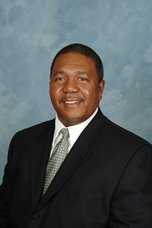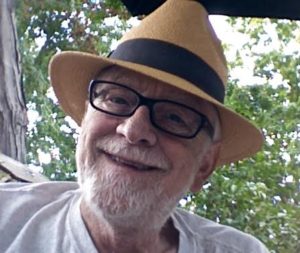The black church and the civil rights movement: 11 a.m. Sunday “the most segregated hour”
By Robert R. Thomas
The July 21 Tendaji Talk at Flint Public Library featured Rev. Dr. Kim DeWayne Yarber, Pastor of Flint’s Mount Hermon Baptist Church for the past 20 years.

Kim DeWayne Yarber
Yarber opened the talk before an audience of 25 by stating his focus would be on racism and religion. He then reiterated Martin Luther King’s statement that the most segregated hour in America was 11 a.m. Sunday where worship of the same deity was equal but separate.
Teaching courses in History of African American Religion and the Civil Rights Movement as an adjunct professor in UM-Flint’s Africana Studies Department as well as UM-Dearborn, Yarber peppered his address with historical, scholarly and theological vignettes.
He examined the evolution of African American religious history by describing what happened when the theological pluralism of African beliefs met the monotheism of the Judeo-Christian tradition. As an audience participant put it, “African cosmology changed when they were brought to America as slaves.”
Yarber said that while the Catholics showed little interest in proselytizing the African Americans due to doubts about the existence of their souls, the Baptists and Methodists were interested in evangelizing, which is why there are so many black churches with Baptist and Methodist roots.
The first African American church, Yarber related, began with a black Methodist preacher born into slavery, Rev. Richard Allen of Philadelphia, who preached to African Americans early in the morning before the white congregants arrived for their service. Prior to Allen’s services, blacks and whites worshipped together, but blacks sat in a balcony in the far back of the church commonly called “the crows nest.”
Eventually Allen and his early morning congregants formed their own denomination in Philadelphia in 1794, the African Methodist Episcopal Church. With that the African American Christian church was underway.
Yarber defined theology as “God talk,” which he further refined as “us talking about God, not God talking to us.”
There is little theological difference, Yarber asserted, between African American and white churches. The religion, he noted, is primarily Christianity. To him the major difference is the worship service. African American churches are arguably livelier, he said, due to their African heritage. Drums, for example, entered the services along with a more dynamic form of preaching and prayer, the call and the response.
“It’s not just religion dipped in chocolate; it’s people who experience God in a different way,” said Yarber.
“So where do we get into this race thing when it comes to religion? Well, in America we get into race early on.”
Yarber pointed out that the African American church inherited the Judeo-Christian traditions, mythologies and their Bible. Among the mythologies came the Curse of Ham, Noah’s son, in Genesis 9. Ham may have had sexual relations with his father while Noah was drunk, passed out and naked. But whatever his sin, Ham’s punishment was a curse on all his descendants.
This Biblical interpretation of the origins of black people as the cursed descendants of Ham is an excellent example of racist theologizing. But the Biblical story, according to Yarber, is not the problem; the problem comes from the interpretation of that story.
To counter racist religious interpretations like the Curse of Ham, Yarber advised a more learned clergy, without which a more enlightened congregation is seriously impaired. An imperative antidote to racist interpretations of Biblical mythology, he said, is education, which he summarized as: think, reason, communicate.
Even in African American Christian communities, Yarber pointed out a racism that derives from a resistance to pluralism, an inheritance from Christianity’s monotheism. There are those who really believe that their religion is better or greater than somebody else’s religion, said Yarber.
“I’d like to get people to rethink that, and understand that while Christianity is the major religion in the United States, this is a big world. There are people all over the world who practice different faiths. The majority of people do not practice Christianity. We are not the majority. We are probably a lot closer to the minority because we have a limited world view. I have a problem with thinking that God created all these people all over the world for the simple practice of whacking them because they are not Christian.”
“Racism in religion is real. I studied on this for a number of years. And it bothered me. How did we get to this? How do we decide who is loved by God and who is not loved by God?
“And yet we find far too many Christian people who hate anybody or any group that is not Christian. It seems to me that there would be something wrong about that.”
The Tendaji Talks, centered on tackling racism, continue on Aug 2 at 6 p.m. at FPL with “Collecting Oral Histories in Flint” featuring UM-Flint Professor of English/Sociolinguistics, Erica Britt. Previous Tendaji Talks can be found on YouTube via the FPL website by clicking the Tendaji Talks tab.
 EVM staff writer Robert Thomas can be reached at captzero@sbcglobal.net.
EVM staff writer Robert Thomas can be reached at captzero@sbcglobal.net.



You must be logged in to post a comment.